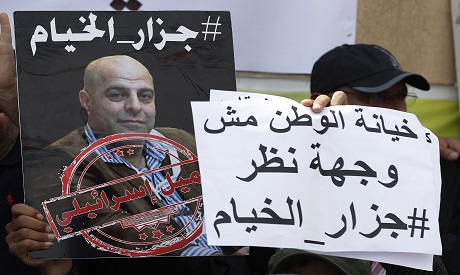
File photo: In this file photo members of the Lebanese Shiite Amal movement on September 15, 2019, hold a photograph of Amer al-Fakhoury, dring a demonstration in front of the former Israeli-run prison of Khiyam on the border with Israel, to demand his trial. (AFP)
Lebanon's foreign minister on Friday summoned the U.S. ambassador, seeking an explanation for how an American on trial in Beirut was transferred out of the country from the U.S. Embassy compound.
The Lebanese-American man, Amer Fakhoury, was ordered released Thursday by a judge in Lebanon because more than 10 years had passed since he allegedly tortured prisoners at a jail run by an Israel-backed Lebanese militia. Fakhoury has denied the charges. Another military tribunal contested the release, effectively banning Fakhoury from leaving the country until the appeal was heard.
But Fakhoury was nonetheless released under unclear circumstances, and on Thursday a U.S. Marine Osprey was seen taking off from the U.S. Embassy compound northeast of Beirut. Later, U.S. officials confirmed Fakhoury traveled out of Lebanon in the Osprey, and was being returned to the U.S. The decision to move him out of Lebanon has been widely criticized there.
Lebanon's official National News Agency said Foreign Minister Nasif Hitti sought an explanation from Ambassador Dorothy Shea for the circumstances of Fakhoury's leaving.
A New Hampshire restaurant owner, Fakhoury received US citizenship last year. He was diagnosed with Stage 4 lymphoma and had been hospitalized in Lebanon. His family and lawyer say that while he did work at the prison, he did not have any contact with inmates.
Local media reported the U.S. Embassy gets an annual permission to fly helicopters out of the embassy compound and not for every single use.
Fakhoury was a member of the Israel-backed milita known as the South Lebanon Army, and had been accused of torturing prisoners at a SLA-run jail during Israel's 18-year occupation of southern Lebanon. He had been imprisoned since September after returning to Lebanon to visit family.
Former prisoners in Khiam prison _ where Fakhoury was allegedly warden until Israel withdrew in 2000 _ protested the decision to free him.
On Friday, representatives of the former prisoners filed a case before prosecutors to investigate who was responsible for violating the travel ban on Fakhoury.
His case had put a significant strain on already troubled ties between the U.S. and Lebanon. Lawmakers in Washington had threatened to withhold critical aid to the country and impose sanctions on the Lebanese military, which is seen by the Trump administration as a bulwark against the Iranian-backed Hezbollah movement.
President Donald Trump thanked the Lebanese government, saying they ``worked with us'' to secure the release of Fakhoury, further muddying the waters.
The parliamentary bloc of Hezbollah criticized the military tribunal for what it called ``succumbing'' to U.S. demands to release Fakhoury, describing him as ``an agent who betrayed his country.'' Hezbollah lawmakers called on authorities to hold te tribunal accountable.
Lebanon and Israel have been officially at war since Israel's creation in 1948. Lebanon bans its citizens from traveling to Israel or having contact with Israelis.
Fakhoury's lawyer and family say he fled Lebanon in 2001 through Israel and eventually to the United States because of death threats he and many other SLA members received after Israel ended its occupation.
Short link: